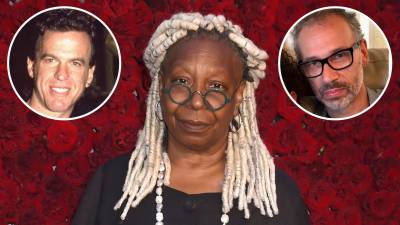

Whoopi Goldberg. Dimitrios Kambouris/Getty Images for The Met Museum/Vogue
The story behind Whoopi Goldberg’s name came straight from a real-life experience.
“Once I started getting parts in plays, I wanted a name that sounded more interesting. Caryn Johnson wasn’t it,” Goldberg, 68, wrote in reference to her real name in her memoir, Bits and Pieces: My Mother, My Brother, and Me, released on Tuesday, May 7.
While she was working at various stage shows, some people started calling her “Whoopi” because she “would sometimes let loose with a fart,” The View star admitted. “I added ‘Cushione’ to it — with a French pronunciation.”
When her first review was written by journalist Welton Jones, the actress recalled her mother, Emma Harris, questioning the name change.
“When we talked on the phone, she said, ‘What is this Whoopi Cushione?’” Goldberg wrote. She answered her mom, saying: “Well, it’s kind of my nickname. It’s like whoopee cushion with a little French accent.”
Her mother continued questioning the name — before coming up with a better idea.
“I explained to her the whole farting thing. ‘Well, if you’re going to change your name and want people to take you seriously, you need a more substantial name,’ my mother advised me,” Goldberg recalled. “I said, ‘Oh, really, great namer of the stars? What do you think it should be?’ She said, ‘Well, you should take one of the names from the family tree. How about Goldberg? That has a nice ring to it.’ That became my name.”
From that point on, “only my family and a few people who knew me early in my life still called me Caryn,” she wrote.
Goldberg’s memoir is dedicated to her mother and brother, Clyde K. Johnson, both of whom have passed away. Harris died at age 78 in 2010 following a stroke while Johnson died at age 65 in 2015.
“It’s time for a book about my nucleus family: my brother, Clyde, and especially about my mother, because none of the other stuff would have happened for me without her,” Goldberg wrote in the Bits and Pieces introduction. She went on to further detail her childhood.
“It wasn’t until I was older that I really understood what my mother had to go through to keep a roof over our heads. My father and mother had separated, so I didn’t grow up with him,” Goldberg recalled. “She tried to get him to pay some support through the courts, but helping Black women living in the projects wasn’t high on the state court’s priority list, and she couldn’t afford a lawyer who might have gotten something done.”
She wrote that her mother “refused to apply for welfare” because she “didn’t like the stigma.”
“I saw her cry once or twice about being unable to pay her taxes,” Goldberg added. “But as a kid, I never grasped that we were always one paycheck away from the worst-case scenario.”








